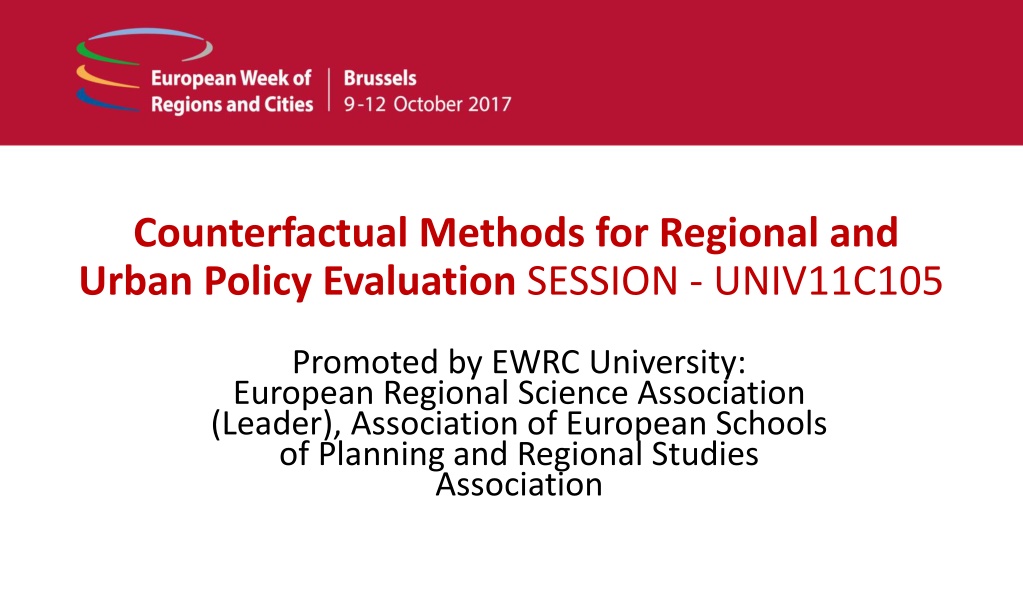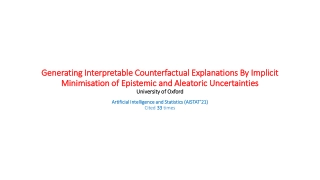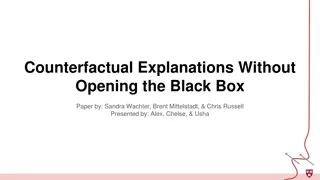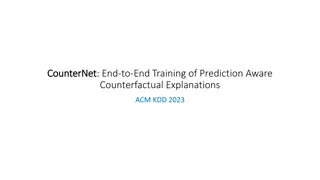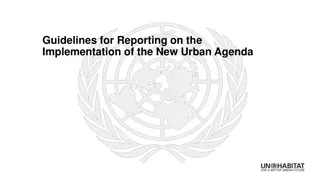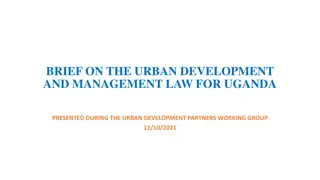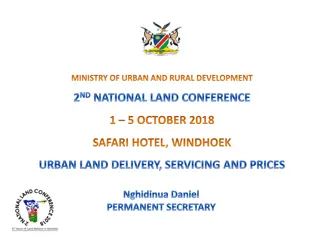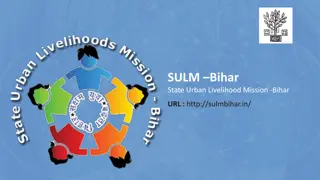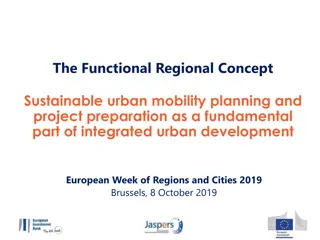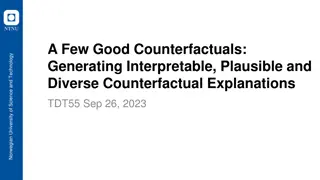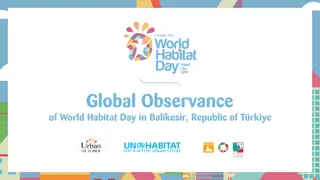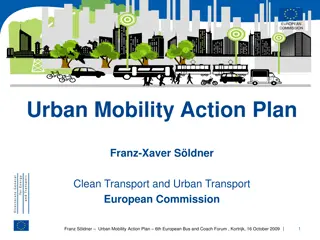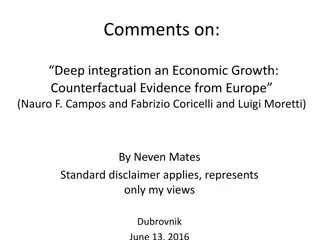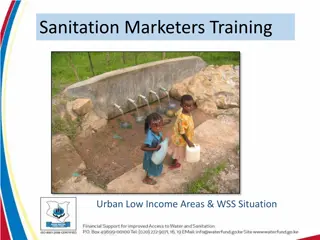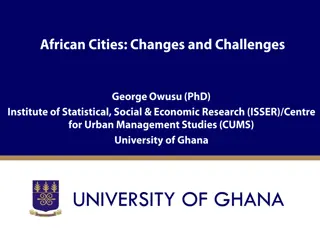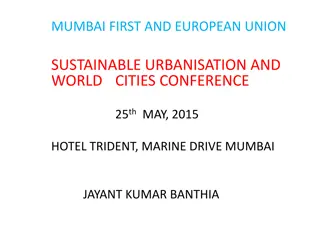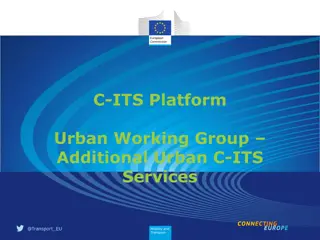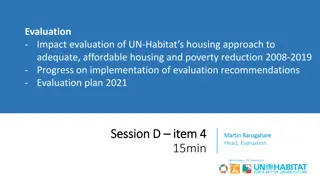Understanding Counterfactual Impact Evaluation in Regional and Urban Policy
Counterfactual Impact Evaluation (CIE) is a vital tool in assessing the effectiveness of policies related to regional and urban development. By comparing treated units with non-treated units, CIE helps determine the true impact of a policy by isolating the effects of the policy itself. This evaluation method is crucial for regional policies due to the increasing demand for evidence-based decision-making, the need for experimental policies, and the complexity of impacts and interactions at regional levels.
Uploaded on Sep 19, 2024 | 0 Views
Download Presentation

Please find below an Image/Link to download the presentation.
The content on the website is provided AS IS for your information and personal use only. It may not be sold, licensed, or shared on other websites without obtaining consent from the author. Download presentation by click this link. If you encounter any issues during the download, it is possible that the publisher has removed the file from their server.
E N D
Presentation Transcript
Counterfactual Methods for Regional and Urban Policy Evaluation SESSION - UNIV11C105 Promoted by EWRC University: European Regional Science Association (Leader), Association of European Schools of Planning and Regional Studies Association
Organisers Marco Mariani, IRPET Regional Institute for Economic Planning of Tuscany, Villa la Quiete alle Montalve, Via Pietro Dazzi 1, 50141 Florence (Italy). marco.mariani@irpet.it Marco applies quantitative evaluation methodologies in the field of enterprise and innovation policies. His interests also encompass active labour market policies, public procurement and cultural economics.
Organisers Elena Ragazzi, IRCRES-CNR Research Institute on Sustainable Economic Growth- National Research Council, Via Real Collegio, 30, 10024 Moncalieri (TO), Italy. elena.ragazzi@ircres.cnr.it Elena is an expert in policy evaluation, with methodological and practical competencies, acquired through the participation in a wide list of projects (most of them as project leader). Her experiences include policies in the fields of training and education, labour market, rural development, culture, equal opportunities, security
Counterfactual evaluation inside the ERSA The ERSA association hosts a lively community of applied scientists working on impact evaluation. The ERSA annual conference has been hosting since 2014 (ST Petersburg, Lisbon, Vienna and Groingen) a special session on counterfactual impact evaluation. The session adopts an inductive style. Researchers are invited not only to present their results but also to discuss about their experience, with the idea that methodological approaches to CIE may benefit by feedbacks from empirical research. This workshop is the heritage of this experience.
What is counterfactual impact evaluation (CIE)? CIE addresses the assessment of the effectiveness of a policy respect to a relevant target variable. If you just observe the change of the variable before and after the treatment you don t know in which portion this change may be ascribed to the policy and which could have been achieved also without it. Only comparing the change in a group of treated units, to the one obtained in a group of non treated units you may get the real impact of the policy. The two groups should be made of identical but independent units, and here come most of the challenges for the evaluators
Why is CIE important for regional policies? Stronger demand of evidence to policy makers and administrators by local communities Implementation of experimental policies Eterogeneity of impacts among countries and regions Interactions among actors at the local level (spatial spillovers)
The workshop Examples (not exaustive) of policies relevant for regions and cities: coesion funds, inclusion policies for migrants, traffic regulation for environmental control that have been evaluated with couterfactual approach Which type of evidences? What are the challenges of their implementation?
The interactive tool The listeners will be involved in the workshop not only for the final open discussion. You will be soon asked to contribute by participating to a consultation concerning your experiences and perceptions, through the event app. You are also enabled in any moment to send questions and comments.
As far as you know, has the institution for which you work ever implemented or commissioned a policy evaluation? Yes No
As far as you know, has the institution for which you work ever implemented or commissioned an evaluation with counterfactual approach? Yes No
If you answered yes to any of the previous questions, please write a positive point attached to that experience (eg: quantification of our perceptions , or more force to support our vision )
If you answered yes to any of the previous questions, please write a negative point attached to that experience (eg: not worth the effort , or no conclusive result )
The presentations PELLEGRINI Guido (Full professor of Statistics and Statistical Methods for Regional Sciences; President of the Italian Association of Regional Science). Department of Social and Economic Sciences, Sapienza University of Rome, P.le Aldo Moro, 5 - 00185 Rome, Italy. guido.pellegrini@uniroma1.it.) The effects of the European Structural Funds: What have we learned from counterfactual evaluations?
The presentations DRANGE Nina (Statistics Norway, Research Department, postboks 8131, Dep., 0033 Oslo, Norway. Nina.Drange@ssb.no) Promoting the integration of immigrants. Lessons from a policy providing free child care
The presentations V DRINE Lionel (CESAER - French National Institute of Agricultural Research, 26 boulevard dr. Petitjean 21000 Dijon CEDEX, France. lionel.vedrine@inra.fr) The effects of urban tolls and low emission zones: Evidence from counterfactual evaluations
After the end of the workshop, we would know your perceptions about counterfactual evaluation. Please select up to 3 words in the following list Feasible Costly Scientific Interesting Useful Uncertain Difficult Stakeholder resistance Sound evidence Not for practitioners Insightful Aversion Unexpected troublesome results . (please add your word) Legitimizing
Roundtable question Good evaluations do not only need correct methods but also: Well designed policies (clear and univocal goals, well defined targets, joint design of the policy and of the evaluation) Cooperation with policy makers that are motivated and aware of challenges, potentialities and limitations of (C)IE You are invited to comment upon the relationship evaluator authority promoting the evaluation body in charge of the policy implementation in your specific field of evaluation
Thank-you for your attention and cooperation elena.ragazzi@ircres.cnr.it
